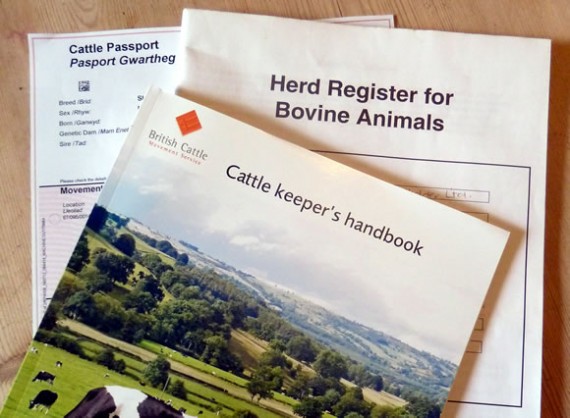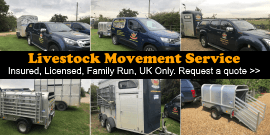Cattle legalities and practicalities
CPH and herd numbers
Firstly, the legalities – if you are going to keep cattle on your smallholding, you will need to get a County Parish Holding (CPH XX/XXX/XXXX) number, if you don’t already have one.
Your local DeFRA / Scottish Government Rural Payments and Inspection Division will issue you with one; you then need to contact your local Animal Health office to get a cattle herd number (UKXXXXXX). This UK herd number goes on all paperwork and cattle ID.
The AHO will, in due course, contact you about the local TB testing regime. In Scotland, there is also mandatory testing for Bovine Viral Diarrhoea (BVD).
British Cattle Movement Service
After you get your herd number, the British Cattle Movement Service (BCMS) will contact you. This is the organisation in the UK that records and tracks all cattle movements via cattle ID and passports.
Calves are tagged shortly after birth and birth notified to BCMS, which issues a passport – so when you buy your cattle, make sure they have an eartag in each ear and that the number on the tags is the same as the number on the passport that the vendor gives you.
When you move cattle on and off your holding, you notify BCMS electronically and update the passport – it’s really not difficult.
DO NOT lose the passport – it is expensive to replace and will cause all sorts of difficulties. The hardest part of the paperwork, I find, is remembering to do it, simply because I don’t move cattle very often.
You will receive a Herd Register for Bovine Animals in which you record all movements, all medicines purchased and all medicines administered, and a Cattle Keeper's Handbook, containing lots of information about cattle registration, identification and movement.
 Cattle paperwork is not too onerous, and there's plenty of help available
Cattle paperwork is not too onerous, and there's plenty of help available
Registering with a vet
Secondly, some practicalities – you need to be registered with a veterinary practice that deals with farm animals. I’d recommend that you discuss your prospective cattle-keeping venture with your vet before you buy any animals.
S/he will be able to help you with health planning and answer any queries about the local position regarding TB and liver fluke. You vet practice may also be able to help with supply of small quantities of wormer and flukicide.
I’d also recommend that you think about how you will deal with surplus animals, whether they are bullocks, heifers, cows or bulls. Find out where the nearest market is or abattoir, if you are planning to finish your animals yourself. But more of that later. :-)
- Previous « Starting with cattle
- Next Enterprises involving cattle »

About Rosemary Champion
Rosemary lives on a 12 acre smallholding in Angus, in the east of Scotland, where she keeps Ryeland Sheep, Shetland cattle and assorted poultry. She was destined to be a smallholder from an early age.
Further Reading
 Caring for Cows Val Porter |  Practical Cattle Farming Kat Bazeley |  The Illustrated Guide to Cows Celia Lewis |  Cows for the Smallholder Val Porter |  |










